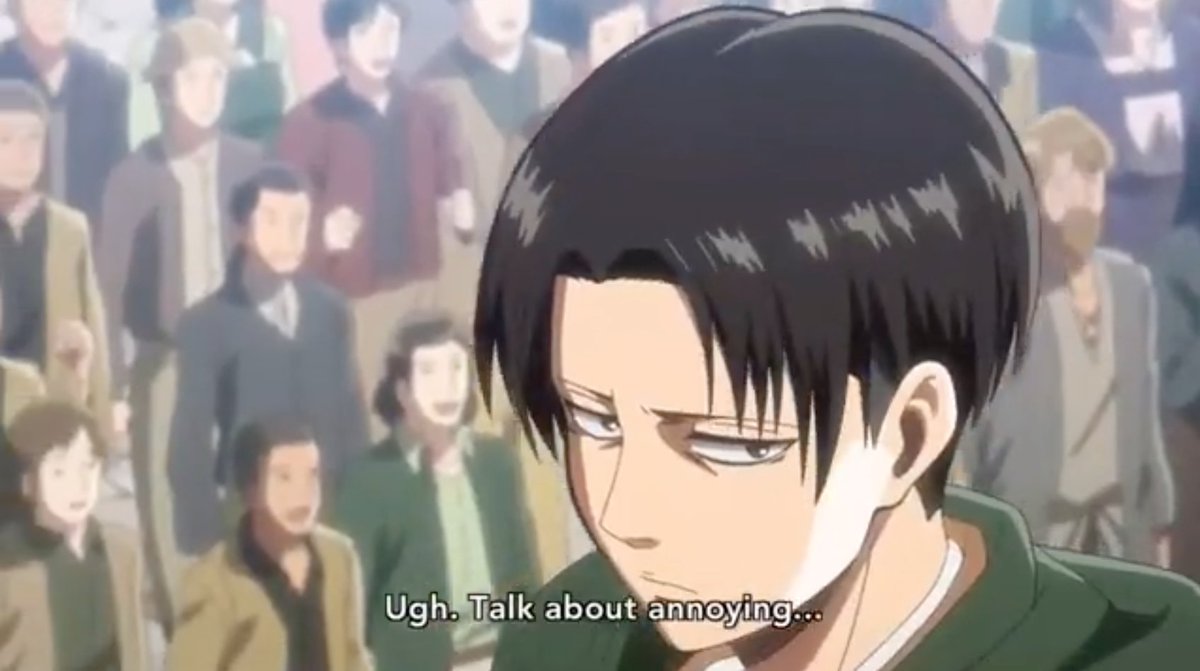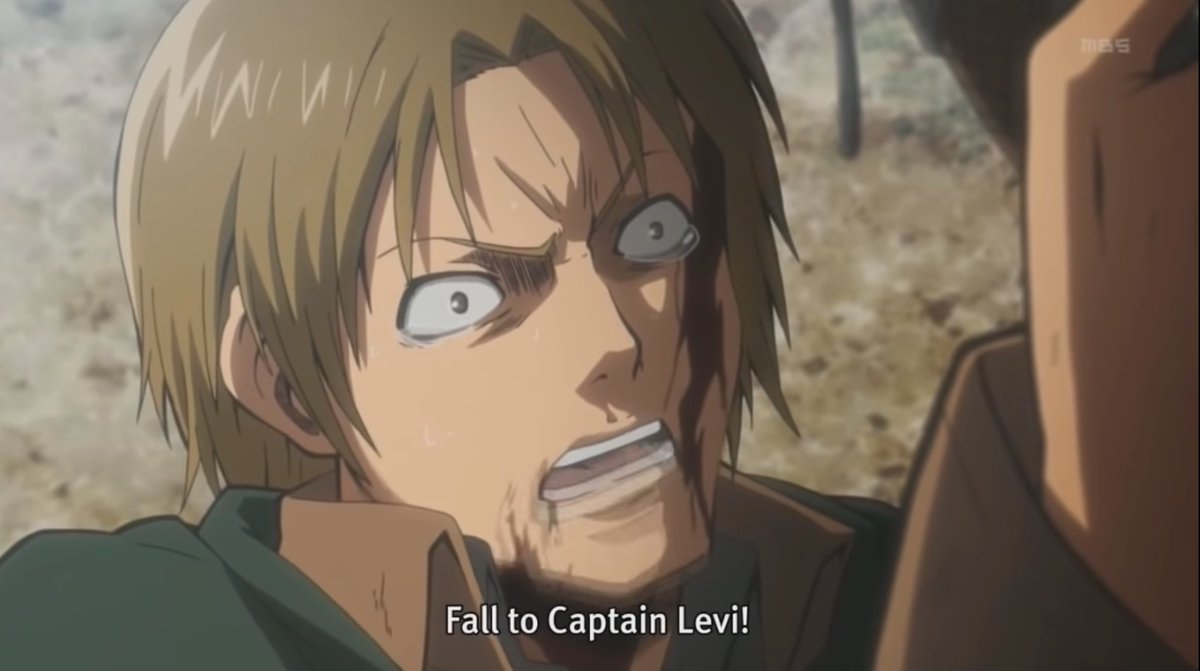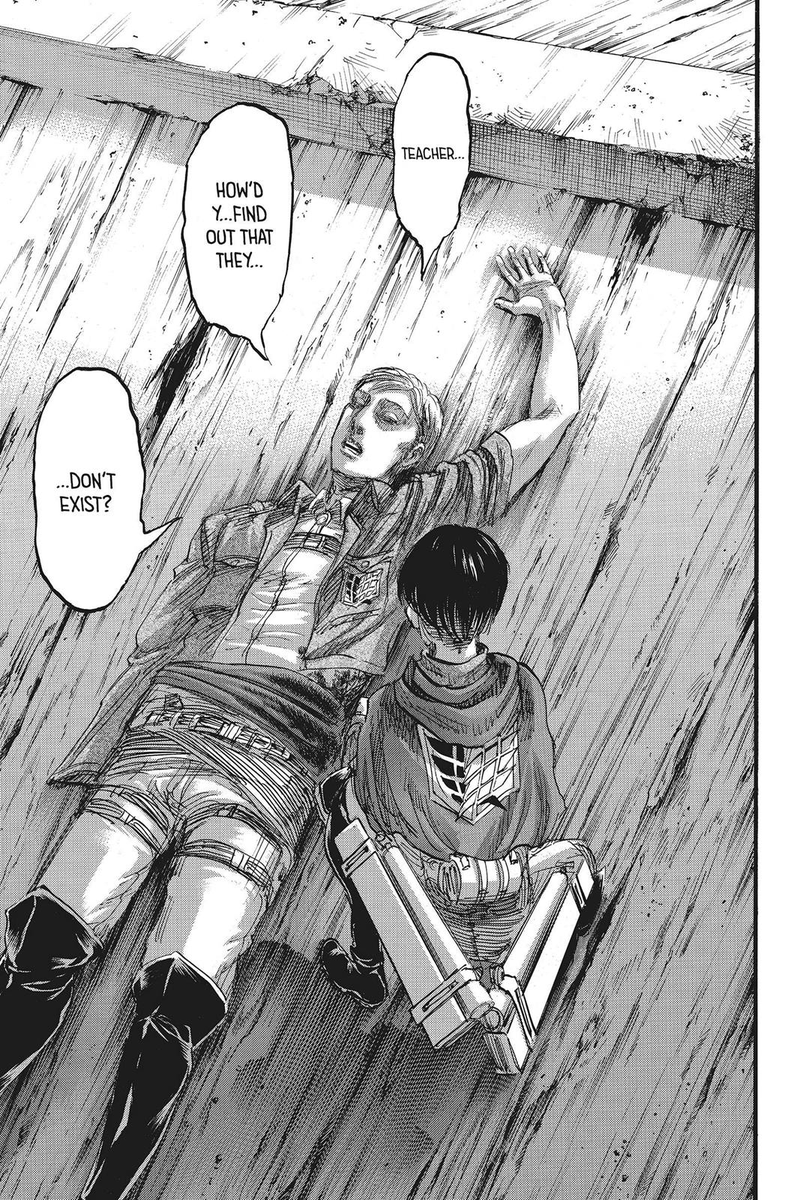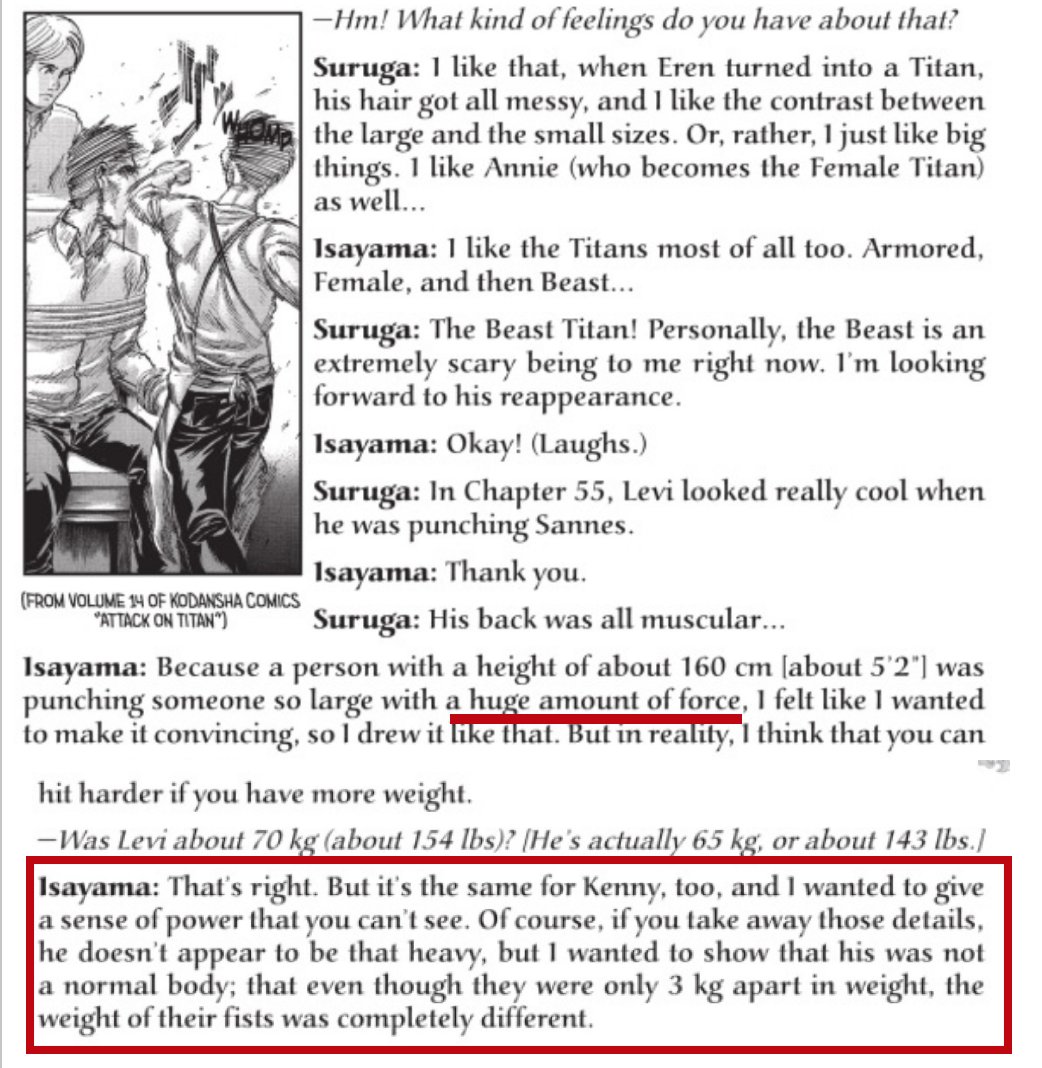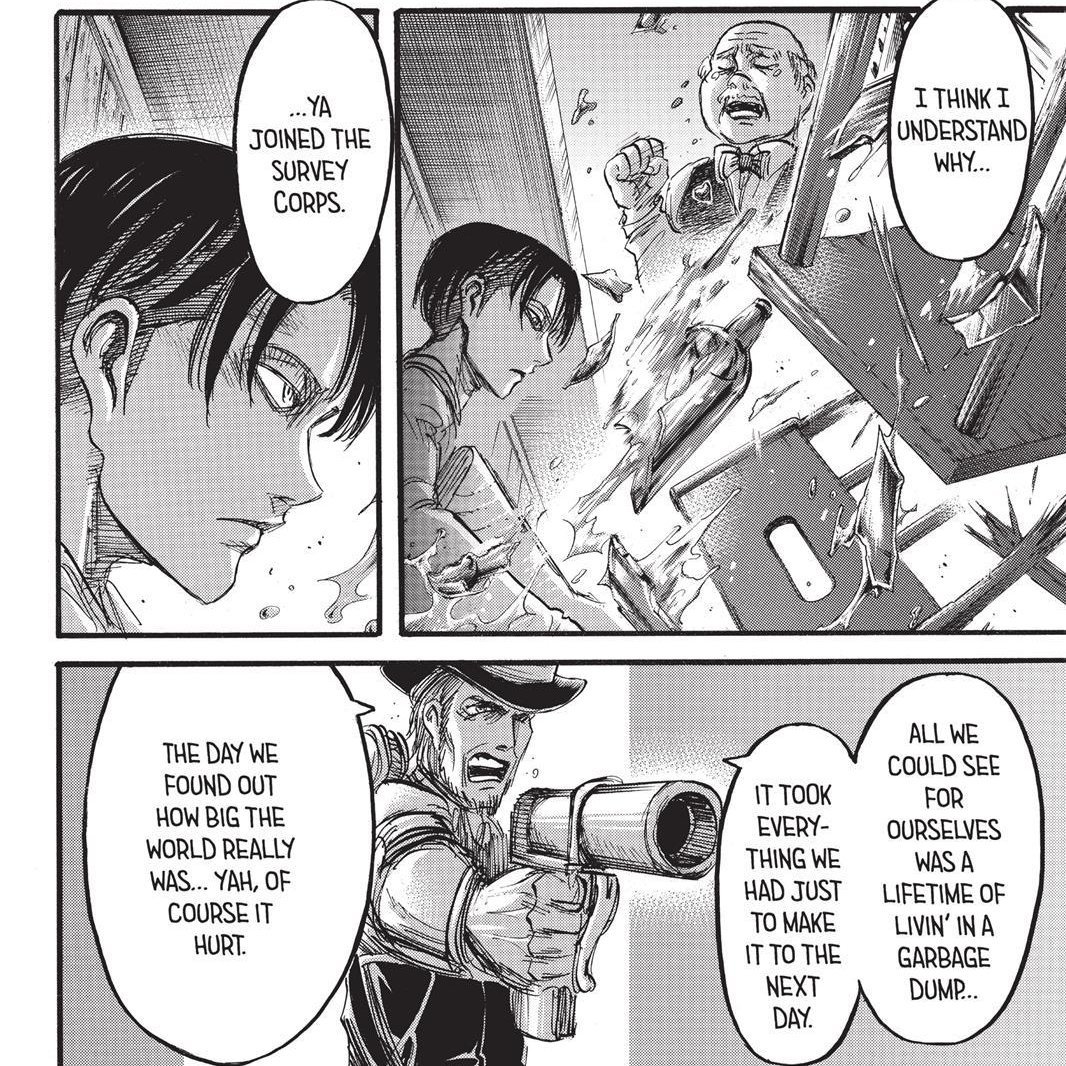Nameless Soldiers & Collateral Damage
Thread on how and why AoT leverages the purposefully unnamed and minor characters to convey the weight of choices
#aotmangaspoilers
Thread on how and why AoT leverages the purposefully unnamed and minor characters to convey the weight of choices
#aotmangaspoilers

One of my favorite chapters is #80: "The Nameless Soldiers"
While it is often remembered for the amazing speech a beloved character gives (Erwin) or the heart-wrenching interaction of a dynamic we're invested in (Levi & Erwin), it's named after the nameless soldiers for a reason

While it is often remembered for the amazing speech a beloved character gives (Erwin) or the heart-wrenching interaction of a dynamic we're invested in (Levi & Erwin), it's named after the nameless soldiers for a reason


In this chapter, two moments draw the reader's attention to the characters we're not invested in, and the importance of their lives:
1. Levi's apology, purposefully directed to recruits he's not close to
2.Erwin's words on the meaning of the mostly nameless recruits' lives



1. Levi's apology, purposefully directed to recruits he's not close to
2.Erwin's words on the meaning of the mostly nameless recruits' lives




Next chapter, we see the charge is led by Erwin until he's hit, then led by Marlowe until he falls too
Ultimately, despite Zeke assuming he wiped them all out, we see 3 soldiers still charging despite watching all that death with no leader to spur them on anymore
Who are they?


Ultimately, despite Zeke assuming he wiped them all out, we see 3 soldiers still charging despite watching all that death with no leader to spur them on anymore
Who are they?



These young, new recruits had reason to falter: there were only 3 & had witnessed so much death, with time to think on their own
We don't know them, but given the timing, had they chosen to stop, maybe Levi wouldn't have reached Zeke, maybe something would've changed



We don't know them, but given the timing, had they chosen to stop, maybe Levi wouldn't have reached Zeke, maybe something would've changed




It's kind of like a callback to the Female Titan arc where Eren see nameless soldiers cut down by Annie as she tries to reach them, anguished over each death
After, when Erwin attempts to thank Levi, he says it's only due to those nameless soldiers' lives that they lured Annie



After, when Erwin attempts to thank Levi, he says it's only due to those nameless soldiers' lives that they lured Annie




The real impact of those nameless lives is shown by what these nameless sacrifices did, what the characters couldn't have done without them
But also "The Nameless Soldiers" and the charge serves as a precursor Floch's speeches during Midnight Sun and later at the awards ceremony

But also "The Nameless Soldiers" and the charge serves as a precursor Floch's speeches during Midnight Sun and later at the awards ceremony


Isayama discussed this in interviews, he wanted to leverage Floch to avoid a protagonist-only POV here, call out the world is bigger than just our main cast and there are others suffering even though the reader is inclined to care only for characters we know (like Armin & Erwin) 

These aren't the only times he's done this
One example is Annie's capture in Stohess. Significant emphasis is given to the civilians affected, with panels devoted to them, the MPs' reactions, Erwin being questioned over it, and Hitch bringing it up to Marlowe and Levi & co.



One example is Annie's capture in Stohess. Significant emphasis is given to the civilians affected, with panels devoted to them, the MPs' reactions, Erwin being questioned over it, and Hitch bringing it up to Marlowe and Levi & co.




Many stories don't dwell on collateral damage and impact to nameless civilians and they don't spend much time highlighting the unnamed "red shirt" soldiers who exist more or less to be killed off while preserving the main characters because it can prompt uncomfortable thoughts 



By that, I mean- Hitch calling out the Survey Corps draws attention to the fact that innocents died, which makes the reader wonder things about the Scouts' actions- was it heroic, worth it?
Is Eren and Mikasa's fight for their friend admirable, or prioritizing only their wants?

Is Eren and Mikasa's fight for their friend admirable, or prioritizing only their wants?


These types of questions are naturally upsetting to the reader because we're invested in the Survey Corps and want to root for them over characters we know nothing about
And we've spent time with EMA and feel their bond over Floch's suffering from Sandra & Gordon's loss

And we've spent time with EMA and feel their bond over Floch's suffering from Sandra & Gordon's loss
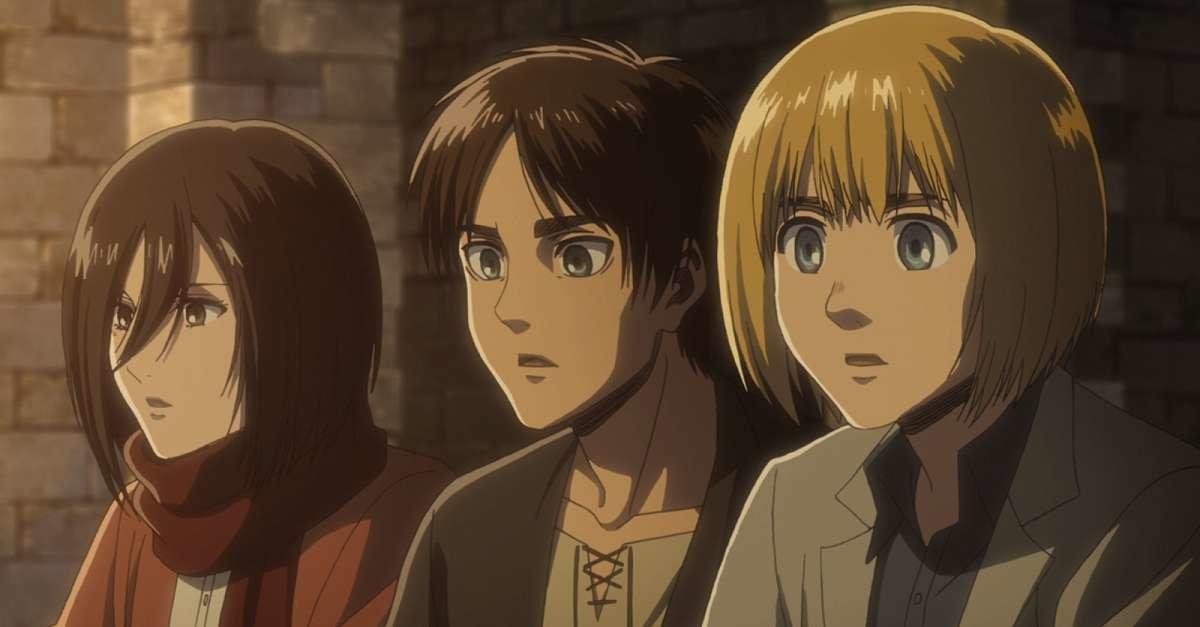

But AoT routinely forces the reader to remember collateral damage, losses not as obviously felt, and that lives exist outside of our characters- lives that are impacted by their actions
From Armin's transformation in Liberio to Eren walking the Marleyan streets observing people



From Armin's transformation in Liberio to Eren walking the Marleyan streets observing people


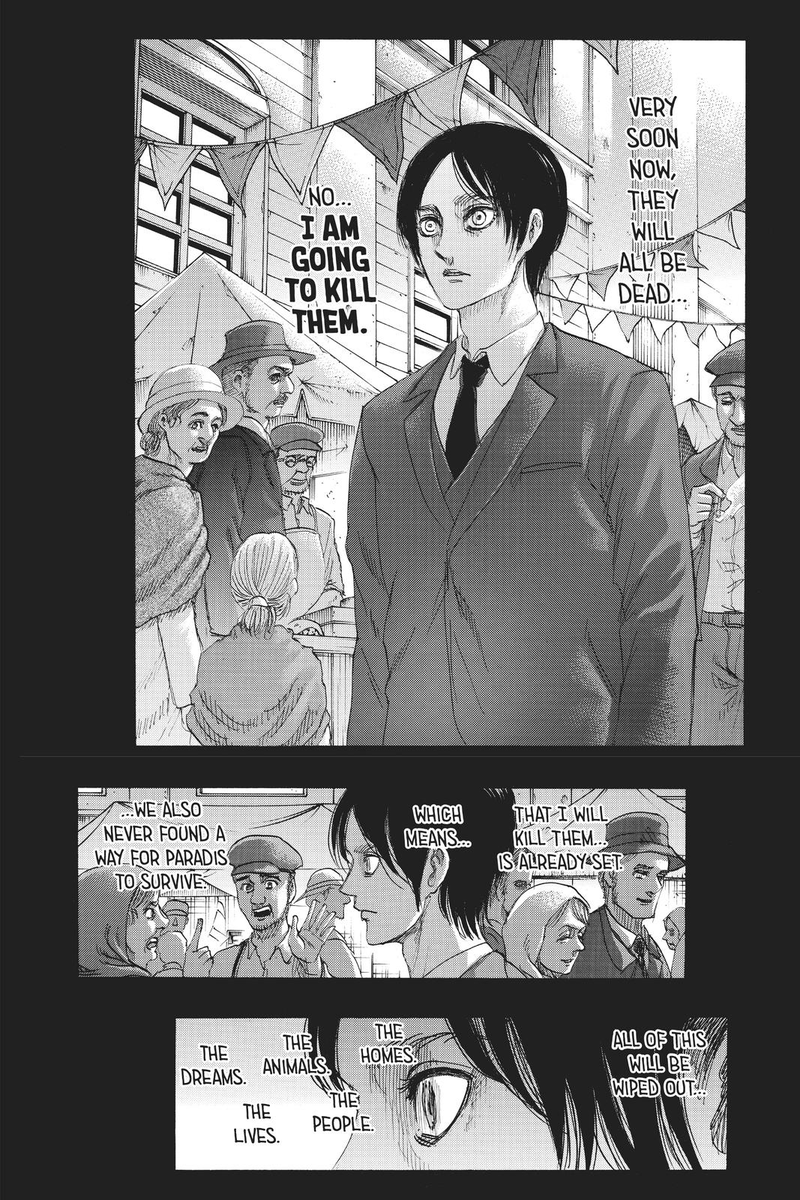

And in situations like the port battle, the nameless Yeagerists show iemotion, and instead of having Connie & Armin face someone random, it's Samuel & Daz from the 104th, to make them feel more real, like they have lives outside of these pages
This is a purposeful choice


This is a purposeful choice



Isayama also has a habit of building up characters right before they die, giving them emphasis, personality, and/or dynamics
So when characters like Nifa or Varis (who had been depicted by Levi for chapters) die and we see Levi's horrified reaction, it resonates more



So when characters like Nifa or Varis (who had been depicted by Levi for chapters) die and we see Levi's horrified reaction, it resonates more




Then there's Levi's character interacting with this as a "man of the people", speaking for starving mothers and children of the forsaken district of Trost & the people who can't eat within the Walls, reminding us of the value & struggle of their lives
https://twitter.com/whofavoredfire/status/1511243468319825920
All of this is 100x with the Rumbling. Arguably the amount of time AoT spends on nameless or mostly unknown characters can be seen as too much- pages upon pages of people impacted
Even within Paradis, attention is drawn to how the Walls falling killed civilians
It's inescapable



Even within Paradis, attention is drawn to how the Walls falling killed civilians
It's inescapable




While that's obviously to draw attention to the magnitude & horror of the Rumbling, I think this overall trend serves another purpose
Isayama has discussed multiple times that he doesn't want to tell the reader what's right so much as honestly & understandably portray conflicts

Isayama has discussed multiple times that he doesn't want to tell the reader what's right so much as honestly & understandably portray conflicts


"Show, don't tell" is an often cited adage to writers because telling a reader what is and what to feel doesn't have the same impact as illustrating the event and letting the weight of the circumstances land through empathy, emotion, and experience 







If AoT told us "there were significant consequences to the Rumbling" or "others died in RtS", we'd understand that rationally but it may not feel as real or important as moments like Eren's desperation to save Armin
Showing Ramzi die hurts more than a footnote saying 1M kids died

Showing Ramzi die hurts more than a footnote saying 1M kids died
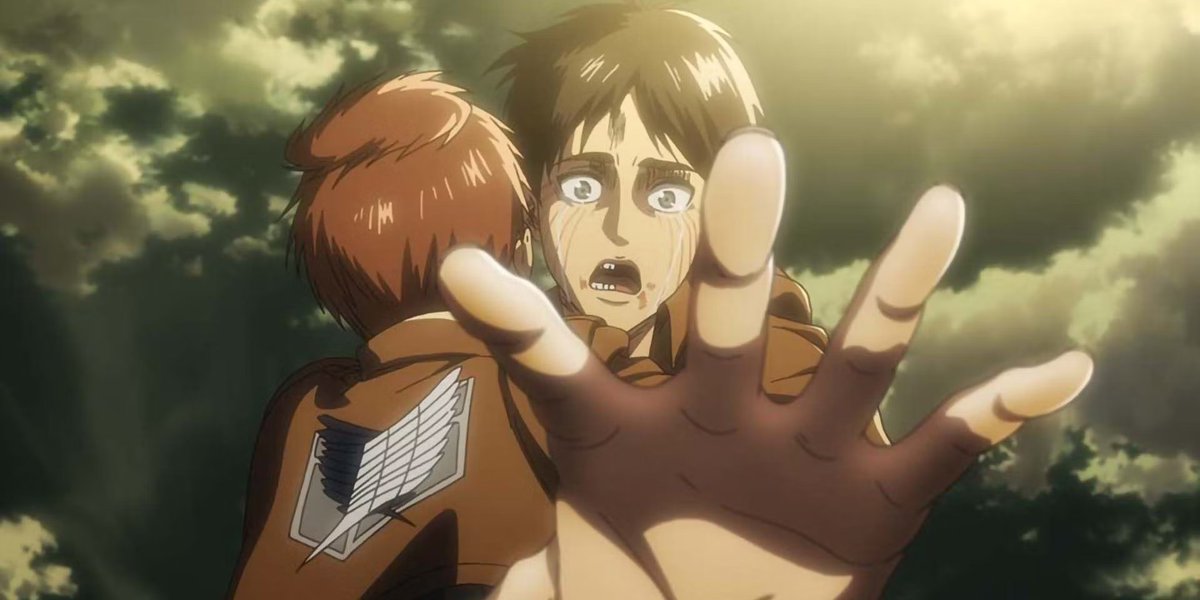

That's why AoT emphases the "nameless soldiers", has Levi apologize to them & Erwin say their lives had meaning imo
Focusing on Zofia, Udo, Varis, Nifa, the people Hitch pulls from the rumble, the congregation Annie falls on, & the last 3 soldiers left in the charge



Focusing on Zofia, Udo, Varis, Nifa, the people Hitch pulls from the rumble, the congregation Annie falls on, & the last 3 soldiers left in the charge




To me, it's to remind of the weight of choices & consequences
Amidst Erwin's sacrifice, the vow, Zeke's actions, all characters & dynamics we have reason to care about, in addition to our main cast, there were ~100 nameless soldiers affected and the story wants you to feel that
Amidst Erwin's sacrifice, the vow, Zeke's actions, all characters & dynamics we have reason to care about, in addition to our main cast, there were ~100 nameless soldiers affected and the story wants you to feel that

• • •
Missing some Tweet in this thread? You can try to
force a refresh





